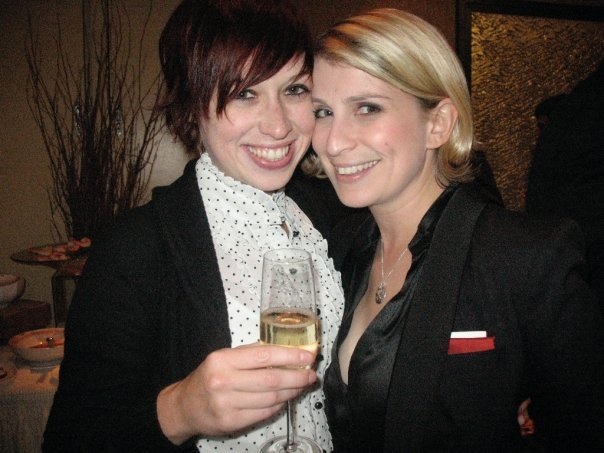
Liz Feldman with her fiancée, Rachael Cantu, 2010. Photo by Keira Fromm.
On March 26 and 27, the Supreme Court will hear two landmark cases that could determine whether my May “wedding” has to have quotes on it or not. It won’t be the first time my marriage rights have been on the line and up to the whims of complete strangers, some stranger than others. I’m looking at you, Antonin Scalia.
The passing of Prop 8 was a profoundly personal punch in the gut.
In 2008, I voted no on Proposition 8, but unfortunately, over seven million Californians voted to pass an initiative that made it illegal for gay and lesbian couples to get married in our state. The night I heard the news that Prop 8 had passed, I cried myself to sleep. To me, the passing of Prop 8 was a profoundly personal punch in the gut. I’m a human being who simply wants to get married someday, but a majority of Californians decided to deny me that dream.
I’m not sure how same-sex marriage even became a thing that people got to vote on. Marriage isn’t public; it’s private. It’s between two people, not between two people and everyone over 18 who hasn’t been to prison. The only person who should get a say in who I marry is who I marry. And so, I’m getting married. Last May, I proposed to my girlfriend of four years and I didn’t put an initiative on the ballot to ask if it was cool with California.
My fiancée and I know very well that same-sex marriage is a tricky concept for some people. She has relatives who are opposed to it for religious reasons and I even have an atheist acupuncturist who recently told me he thinks we deserve full rights, but that we shouldn’t be able to call it “marriage.” I told him I understood that the concept of same-sex marriage made him uncomfortable. And I asked him which seemed more fair: that I be denied the right to marry the person I love so he could be comfortable or that he work through his discomfort so that I could be equal.
The two cases coming before the court are about more than just the privilege of using the word “marriage.”
Right now, my fiancée and I can only legally be domestic partners; and if we want to celebrate our union, we can have a commitment ceremony that means nothing in the eyes of the law. But to us, having a commitment ceremony feels a little too much like saying vows at a separate water fountain. Our “wedding” is set for May, and its legitimacy rests in the hands of the nine Supreme Court judges who don’t know me but suddenly have an enormous amount of control over my future.
The two cases coming before the court are about more than just the privilege of using the word “marriage.” They’re about the thousand federal benefits, including tax breaks, social security assistance, and parental custody rights that gay and lesbian couples are not allowed to have.
First, on March 26, the court will hear Hollingsworth v. Perry, which challenges Prop 8. The following day, the court will review the United States v. Windsor. The plaintiff, Edith Windsor, is an 83-year-old widow who was forced to pay over $300,000 in estate taxes when her partner of 40 years died. She wouldn’t have had to pay a penny if her partnership had been federally recognized. Windsor is challenging the constitutionality of the Defense of Marriage Act, which was signed into law by President Clinton in 1996. The law states that the United States only recognizes marriages between one man and one woman.
DOMA considers us less than equal to a straight couple that has been together for four minutes.
So, even though my fiancée and I have been in a healthy, loving, super-fun relationship for more than four years, DOMA considers us less than equal to a straight couple that has been together for, say, four minutes. The law allows total strangers to marry on an impulse in Vegas, but it denies the right to lifelong partners.
Recently, Bill Clinton disavowed the very law he enacted. In an Op-Ed for the Washington Post, he put it best: “Among other things, these couples cannot file their taxes jointly, take unpaid leave to care for a sick or injured spouse or receive equal family health and pension benefits as federal civilian employees. Yet they pay taxes, contribute to their communities and, like all couples, aspire to live in committed, loving relationships, recognized and respected by our laws.”
My fiancée and I are hopeful that the laws are about to change. If five out of nine judges vote to overturn Prop 8, marriage will become legal in California. If five judges vote to dump DOMA from the constitution, full marriage equality could be a reality for every LGBT citizen.
The decisions for both cases will be written and announced by late June. Our wedding is scheduled for six weeks earlier. My fiancée and I both know that our “marriage” won’t be legal that day in May. But that’s when we want to get married, and we’re not leaving it up to a vote. That being said, we have our ring fingers crossed that the Supreme Court decides to right the wrongs of past and present discrimination, because every committed couple has the right to the federal recognition and personal happiness that comes with true equality.

